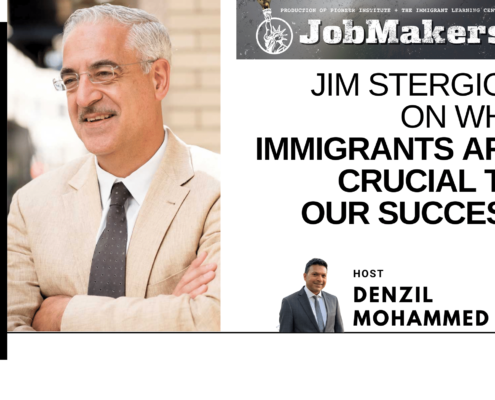Steve Tobocman and Mamba Hamissi on How Refugees Are Revitalizing Detroit
/in Economic Opportunity, Featured, JobMakers /by Editorial StaffThis week on JobMakers, host Denzil Mohammed talks with Steve Tobocman, head of the economic development nonprofit Global Detroit, and one of the thousands of refugee business owners he’s assisted, Mamba Hamissi, Burundi native and co-founder of Baobab Fare, an East African restaurant. They discuss their work to harness the immigrant work ethic to rebuild Detroit and infuse it with life and culture. In the early 2000s, the city fell on hard times, when population loss and the economic downturn led to the largest municipal bankruptcy filing in U.S. history. But that’s where immigrants and refugees come in. As they’ve done for generations, immigrants move to places with affordable rents, and they often have few other options for earning an income than starting small businesses. It’s no wonder then that they have higher than average rates of entrepreneurship. We’ll learn about how a modest investment in a newcomer’s business can help lift up an entire community, in this week’s JobMakers podcast.
Guests:
 Mamba Hamissi is originally from Burundi, East Africa. His wife, Nadia, was an activist there, and her life was threatened. They decided to flee the country and applied for refugee status. America was the first country to provide a refugee visa, but only for Mamba’s wife. Nadia, while pregnant, left Africa and was living in a shelter here in America before Mamba finally got to join her, when his children were 2 years old. He and his wife launched a restaurant, Baobab Fare, a traditional East African eatery and cafe in Detroit’s New Center neighborhood. During and after COVID, the couple have prepared meals for frontline workers, and donated proceeds from the sale of their imported Burundi coffee to support immigrants impacted by the pandemic. Their business was named by the popular food blog, Eater, as one America’s top dining destinations.
Mamba Hamissi is originally from Burundi, East Africa. His wife, Nadia, was an activist there, and her life was threatened. They decided to flee the country and applied for refugee status. America was the first country to provide a refugee visa, but only for Mamba’s wife. Nadia, while pregnant, left Africa and was living in a shelter here in America before Mamba finally got to join her, when his children were 2 years old. He and his wife launched a restaurant, Baobab Fare, a traditional East African eatery and cafe in Detroit’s New Center neighborhood. During and after COVID, the couple have prepared meals for frontline workers, and donated proceeds from the sale of their imported Burundi coffee to support immigrants impacted by the pandemic. Their business was named by the popular food blog, Eater, as one America’s top dining destinations.
 Steve Tobocman has served since 2010 as executive director of Global Detroit, a regional economic and community development organization advancing immigrant-inclusive strategies to drive the revitalization of Detroit. Steve also led the creation and growth of the Welcoming Economies Global Network, a 10-state regional network of immigrant economic development peer initiatives across the Rust Belt, and co-led the economic integration session at the Obama White House’s first immigrant integration convening. Steve has authored numerous studies and research reports and is often a featured speaker on the topic of immigrant economic development and has opinion pieces on the topic appear in the Washington Post, Politico, and numerous local and national publications. Steve previously served as the elected representative from Michigan’s 12th State House District in Detroit. He co-directs the Michigan Political Leadership Program at Michigan State University and is a partner at New Solutions Group, LLC, a Detroit-based consulting firm. Steve earned his Juris Doctor cum laude from the University of Michigan Law School and a Masters in Public Policy from UM’s Ford School of Public Policy.
Steve Tobocman has served since 2010 as executive director of Global Detroit, a regional economic and community development organization advancing immigrant-inclusive strategies to drive the revitalization of Detroit. Steve also led the creation and growth of the Welcoming Economies Global Network, a 10-state regional network of immigrant economic development peer initiatives across the Rust Belt, and co-led the economic integration session at the Obama White House’s first immigrant integration convening. Steve has authored numerous studies and research reports and is often a featured speaker on the topic of immigrant economic development and has opinion pieces on the topic appear in the Washington Post, Politico, and numerous local and national publications. Steve previously served as the elected representative from Michigan’s 12th State House District in Detroit. He co-directs the Michigan Political Leadership Program at Michigan State University and is a partner at New Solutions Group, LLC, a Detroit-based consulting firm. Steve earned his Juris Doctor cum laude from the University of Michigan Law School and a Masters in Public Policy from UM’s Ford School of Public Policy.
Get new episodes of JobMakers in your inbox!
Read a Transcript of This Episode
Please excuse typos.
Denzil Mohammed:
I’m Denzil Mohammed. Welcome back to Jobmakers.
Denzil Mohammed:
Few cities have fallen as far as Detroit did in the early two thousands. Population lost and the spiral in economic vitality cost the city to make the largest municipal bankruptcy filing in US history. Tough spot, but that’s where immigrants and refugees come in as they’ve done for generations. Immigrants move into places in economic decline because that’s where they can afford the rents. Or in the case of refugees are settled where other refugees are settled in the past, and they build it back up. For Steve Tobocman, head of the Economic development, nonprofit Global Detroit, and Mamba Hamissi, refugee from Burundi and co-founder of Baobab Fare, an East African Restaurant. They see it and they’re doing it building back Detroit and infusing it with life culture and that immigrant work ethic. Immigrants and refugees often have no choice but to start a small business when they move to a new country, it’s no longer then that immigrants and refugees even more so have higher than average rates of business generation. We hear from the economic development leader, Steve and one of the thousands of refugee business owners he’s assisted, Mamba, on how a little help to a newcomer can help build up the entire community, in this week’s Jobmaker’s podcast.
Denzil Mohammed:
Mamba Hamissi, co-founder and CEO of Baobab Fare in Detroit. And Steve Tobocman, executive director of Global Detroit in Detroit. Welcome to the JobMakers Podcast. How are you?
Mamba Hamissi:
Good. Thank you.
Denzil Mohammed:
Mamba, I wanna start with you. You have an incredible story. You and your wife and your twin kids have incredible journey from Central Africa to the US. Tell us how you got here and why you had to move in the first place.
Mamba Hamissi:
Yeah. So the journey started with my wife in 2013, you know, through the country, Burundi. We were born and raised, and then she was a human rights activist, and then she has to flee the country because she was in trouble from the report that she made. And then we end up in Detroit. So Nadia, my wife, found herself in Freedom House. That is 2013. And then after a couple months, she found out she was pregnant, and she was pregnant with, she was pregnant with twins. I tried to join them and unfortunately I got denied a visa two times, and so I saw them for the first time in 2015. November, 2015, I started New Life at the same moment. I didn’t speak the language, of course, I didn’t have a work authorization, very hard time as a, as a migrant and refugee to be in Detroit, right?
Mamba Hamissi:
BecauseDonald Trump was becoming the president of the United States. So there was a lot of you know, messages around. So was was not easy emotionally, same time, I could not, I couldn’t then, you know, even get a job because I didn’t have a, you know, seeking asylum was even tougher than what would be, you know, in the normal days and normal time. I got my work authorization in 2017. So I stay home, start planning the language, watching cartoons with the girls, and you know, using a lot of Google translation so then I can hear how the word sounds. And that’s, I didn’t take a class, so that’s all way I could, I could, you know, start, you know, speaking and listening, which was, was not easy. But, you know, by the time you get in a new country, the only thing is to learn the language.
Mamba Hamissi:
That’s how, the only way you wanna communicate. At the moment, we tried to get a job around Detroit. There was not any job. So I end up working a factory like 45, 50 minutes away from Detroit. And then I realized right away that that is no way I was I would end up my life or this is not something I wanna do all my life. And then meantime on, I was, you know, staying home. There was a program at Freedom House that Steve and Global Detroit, I think they started with Prosperous Detroit. So it was an entrepreneurship program that I took classes, and then that’s program opened my eyes that it’s possible to open a business, it’s possible to be an entrepreneur in this country. I was like, Oh, wow, this is great. So the dream started there. I was like, one day I wanna be, wanna own my own business. Around that time, there was not that many African restaurant with that shows seven 5% of people who live in Detroit at Black. You can go wrong with that, but the reality was not that. The reality was people didn’t know anything about Burundi, didn’t know about anything about East Central Africa. So we have to teach again. And then this is how we started. And then 2017, July we won the Detroit, which was 50,000 prize to open the
Denzil Mohammed:
New business. I wanna get to that, but I mean, just in such a short space of time you arrived here in, your wife arrived in 2013, you got here in 2015, Donald Trump became president. There was a lot of hate, as you say, toward refugees and immigrants and the learning process as well. You said you had to start over. I mean, to start a whole new life again at, at 35. Don’t even know the language. You don’t know the legal structure, you don’t know the culture. You’re depending on the kindness of strangers. That’s just absolutely, absolutely fascinating story. Tell me a little bit about this idea for entrepreneurship.
Mamba Hamissi:
So I grown up my mom on the small restaurant. The restaurant was in, like, in the market, so she would sell food, and then the main goal, main purpose of selling food for her was to make sure, like we have some food on the table so we can eat. So, coming in this country, now that she’s an amazing cook, and I have that background, my mom on the restaurant, I used to tell her, You can cook, I can sell. I know how to sell, but I don’t have the chance to have something I can sell. What can we do? We don’t enjoy the food around, right? And then there is a lot of things that I don’t like a lot of restaurant. How can I change these things? I wanna be responsible for that. I wanna change the behavior, how people eat, right? Because, you know, when I go out there and just complain for everything without taking action, so you have to go and make changes.
Mamba Hamissi:
I felt I had that responsibility that my mom, my motivation was, I, I, I knew I’m not gonna be a baronian animal, and I knew I’m not gonna, people even in Baron did we see they don’t wanna see me again as someone from there. Same to my kids, right? I knew my kids since day one, their American, and then I have to give them a luggage of knowledge, a luggage of confidence, and then have to build it right now. And then the only way you can build it is to share what you have. The only thing I had was my culture. The only thing I have is my education. And that’s, I was like, let me transform this education in this culture so then I can have something strong I can handle to my kids.
Denzil Mohammed:
You, you’ve failed a test. You’re supposed to be in love with chicken McNuggets. I don’t understand how you didn’t like the food here. Steve, you’ve seen this a lot over the years. I know that you grew out of the local Chamber of commerce there in 2010. What did you see at that time and what have you seen since then with the immigrants and refugees coming into Detroit?
Steve Tobocman:
Well, what we’ve seen for a community like Detroit and Southeast Michigan is really strong contributions to our economy. You know, Mamba’s story is like so many other immigrant entrepreneurs, we sometimes call it entrepreneurship out of necessity. That they’re not able to get hired for jobs that they’re trained for or skilled for. They don’t have the networks that many of us have growing up in this in, in this country or in this region. And so then they find a way on their own to really leverage their, their, their labor, their contribution, their, you know, their intellectual contributions and their innovative you know, the, the same kinds of you know, drive that would have them escape or even seek up about human rights abuses in their home country are the, are some of the assets they use to build their businesses.
Steve Tobocman:
So when we launched Global Detroit, it was the Detroit Regional Chamber looking around and saying, you know, what are the economic contributions of immigrants and how do we step in at a time in 2010 where our state economy and our regional economy and our city’s economy were in free fall? We had the worst decade of probably any state in American history. Between 2000 and 2010. We went from the 17th wealthiest state in per capita income to the 41st. This was just a year before Detroit declared itself bankrupt, the largest municipal bankruptcy in US history, where we lost a quarter of the population in the city of Detroit between 2000 and the 2010 census. And so what we saw was that, you know, immigrants of all walks, whether they’re asylum seekers who don’t speak the language to high tech entrepreneurs and graduates and with electrical engineering master’s degrees, that we need to be the automotive design capital of the world going forward.
Steve Tobocman:
And we designed a series of programs and opportunities to support those folks. We saw that in Detroit neighborhoods, which were grossly under retailed across America, 28% of all the main street business owners are immigrant born. And that is true in restaurants where they’re close to 38% of the restaurant owners. But also when you look at grocery stores, there are over 50% of the grocery store owners. And these are critical economic development and community development issues. For a city like Detroit, we designed programs there’s one that global Detroit was intimately involved with called Prosperous Detroit which has trained over a thousand Detroiters in a basic business planning sessions. Those are African American Detroiters. Those are Latinx Detroiters who have been here for three or four generations, but it’s also newer Yemeni Bangladeshi African immigrants who come to the city. They’ve also lent out over three and a half million dollars in micro loans to small businesses and created over 2,500 jobs in the city. So it, it seems like a small strategy to help, you know Nasi apply for their first grant and maybe to give them a small loan to open their business, but when that gets magnified across the city, it becomes a real significant industrial or economic development strategy.
Denzil Mohammed:
You talk about the city being in freefall, and those are some really awful statistics that you put out there. But I think of the idea of neighborhood revitalization, and if Detroit was in such a terrible spot and you have these new, this new blood coming in, as desperate as they may have been that played a huge role in revitalizing the city.
Steve Tobocman:
Absolutely. You know, last year we came out with a really seminal study with a re an urban researcher named Alan Malik and one of our data partners at Data Driven Detroit called Building Inclusive Cities. You can find it@buildinginclusivecities.org. We believe it’s the first study of its kind that looked at a urban neighborhood that had seen relatively rapid immigration growth and not what are the impact for, and how do the immigrants, you know, gain an income and, and get integrated. And acculturated over time. It really looked at the long term residents. So what did it mean for the long term African American residents in a neighborhood we call Bongo Town, East Davison Village, as well as one called Chazy Con. And what we found is that by almost every metric that you would net measure neighborhood health by, whether it’s vacancy tax, foreclosure mortgage, foreclosure blight retail opportunities, crime fires all the bad statistics went down much faster than in the rest of the city of Detroit. And all the good statistics went out much faster. Moreover we found that all residents, including long term African American residents, felt that things in their neighborhood were better than on average in other neighborhoods, felt their neighborhood was going in the right direction and largely actually felt good about newcomers.
Denzil Mohammed:
So, Mamba, what, tell us about your role in the city in terms of bringing in culture, using your background growing a business, and the odd way in which that started vis-a-vis the pandemic.
Mamba Hamissi:
Yeah. you know, the, the role is huge because they, as I said, they, I look forward in the only city, and the only home I have now is Detroit, right? For me and for, for my, my, my family, for my kids. And then that is something that I wanted to point out. Every single immigrant, when we are coming in this country, so we look forward, we don’t look back. So we have to, it’s a responsibility to, to build where we are, first of all, because there is that cliche that, Oh, you are coming here to sell the job. And then that is very, sometimes it’s heavy on our shoulders. We want to prove wrong. No, no, no, no, no. We are here to build the economy. Only not that one is powering other I moves, right? Sometimes this country still big and may be scary to start a new business or to dream about something.
Mamba Hamissi:
And then we, we show them that, hey, it’s possible the American dream is there, but you have to work hard. You have to work hard. Come in this country, 2015, look, where am I now? It’s because I didn’t do nothing magic. I work hard. I listened, I followed the rule. I tried to be, to not be in trouble. So there is a formula is very easy, and once they see that formula, you use it and you’re succeeding. Everybody say, Oh, okay, so I can make my own contribution so I can do something. I can, I can be like mamba. I think that is the responsibility that we have. And then above, that’s the role role that we’re trying to play. Also, hiring other immigrants and refugees who are coming in this country. Sometimes they don’t speak their language. So it’s great to have a space like Barb where they can start or dream or see how things be, and then be the one who will understand them more. And then sometimes you see people coming at work without the jackets in the winter, it’s like, Man, you’re gonna die. You can’t do that. But if it’s coming for me, they feel like, Oh, you understand you’ve been there, but if it’s coming for somebody else, they may felt offended. But we play that role to, you know, to help what the mistakes that we made in the past, so then somebody doesn’t make the same mistake.
Denzil Mohammed:
That’s a huge responsibility you have going on there. And I want, wanna point out again, in less than seven years, you acquired the language, you acquired the skills. We already had a huge skill set coming in, and then you want grants, you want $50,000, another $50,000 in order to start your business. And, but you, you started your business around the same time as the pandemic started, and therefore, you know, you had big dreams, but then that came crashing down. How did you find a way to maintain the momentum in order to see your business finally open? And how did you do any sort of outreach when everything was locked down?
Mamba Hamissi:
For, I feel like for something as a, me as a refugee coming in this country, the first thing is to appreciate the life that you’re living in, in any ways you have better life here than what you can have back home when you’re a refugee, because you’re fleeing the country and then you have another chance in your life. So you take that one with a lot of appreciation, right? And then when you see something like a pandemic, and then you, when a country where you can have, can get the vaccine in a country where the police is not, you know, trying to kill you and try to protect you. You’re getting in a country where you have all these amazing things that you have a lot, but you, you have around, that’s only things you are winning in any battle you can, you can, you know, you can go through.
Mamba Hamissi:
So for us, the pandemic was not easy, but we’ve been always making sure, like people, they know what we are doing. We cry, we met friends, we support people. And then that’s what we did by make meals for, you know the healthcare workers make meals, people who were needed at that time. When we, once the restaurant was open, we start seeing that lot people wanted to give back. And then it is, it’s, it’s not about the family, it’s not about us. It’s about what you do for ours, for others. And then I think that’s, I want people to understand this. It’s very important when you are in this business, you have to be generous. Don’t just look for money. Look for the contribution that you’re making. You are changing things, and then talk to people, remind people, you know, ask for help. It’s possible. And then that is the only way we will succeed. So opening the middle of the pandemic for us was scary, very scary. But the help, the support was amazing.
Denzil Mohammed:
Steve this is one of many, many stories you’ve encountered over the years. Can you just reflect on that a little bit and what it would be your message to other municipalities across the, across the nation?
Steve Tobocman:
Well, I think one of the things I have found working with the immigrant community is, you know a half step forward in welcoming them and supporting them and helping them connect with their dreams and their ambitions is rewarded multiple fold. And so, you know, we set up a session at Freedom House to talk to people about starting businesses, and, you know, and now we have a James Beard nominated, you know, nationally known amazing restaurant that is not only, you know, contributing to our economy but contributes to our culture contributes to the food scene. I remember one of my trips in Detroit a few months ago, and I think I ended up at Mumbas Restaurant three nights in a row. In part because everybody wants to go there. And I would encourage anybody, listen to this podcast next time here in Detroit, Bob Fair is something you should check out.
Steve Tobocman:
But my advice to other municipalities is that there are now in 2022, a number of partners whether it’s global Detroit or Welcoming America, or the American Immigration Council and others who are dedicated to assisting communities to think through the economic opportunities of being inclusive to the immigrant and refugee populations that are growing in your midst. That integration is, you know, there’s federal immigration policies, but integration is a local experience. And rather than bearing your heads in the sand, this is not the third rail of American politics. These are your neighbor immigrants and refugees are your neighbors. They’re the future of your community. And there are plenty of things that you can do to leverage their contributions in ways that benefit everybody in the community. And so what you’re seeing is that numerous communities are rebuilding themselves, are tooling for the future, and creating prosperity, securing their own prosperity into the future through immigrant and refugee inclusion. And there’s a lot of folks out there now to assist communities to think through these, these challenges and how to and how to take advantage of them.
Denzil Mohammed:
And it’s for everyone’s benefit. All Americans, new and old, everyone in that community benefits when people are given the opportunity to thrive. Mamba, you were forced to adapt and start over again at a really difficult time in American history when it comes to immigration. If you had one message to the American public about who refugees and asylums are what do you think that would be?
Mamba Hamissi:
Just, we just need love, and then I promise we gonna give you back the same love. And again, when we are coming in this country as refugees, especially, we don’t, the only house, the only home, the only future is here. You know, be patient with, with, there is a, you know, a lot of things we have to learn, but just be patient with us. One, one thing only. I’m sure a hundred percent we, we love this country, and then that’s the only country we have. And then we are more than happy, honor, and appreciative every single day that we spend in this country.
Denzil Mohammed:
That’s an incredible message, Mamba. Incredible message. Mamba Hamissi, co-founder and CEO of Baobab Fare in Detroit. And Steve Tobocman, executive director of Global Detroit. Thank you for joining us on JobMakers. Thanks for having
Mamba Hamissi:
Us. Thank you.
Denzil Mohammed:
Jobmakers is the weekly podcast about immigrant entrepreneurship and contribution produced by Pioneer Institute, a think tank in Boston and the Immigrant Learning Center in Malden, Massachusetts. A not-for-profit that gives immigrants a voice. Thank you for joining us for this week’s incredible story of one refugee entrepreneur. If you know a similarly outstanding immigrant or refugee business owner or innovator, email Denzel, that’s d e n z i l, job makers podcast.org. I’m Denzil Mohammed. See you next Thursday at noon for another Job Makers podcast.
Recent Episodes:
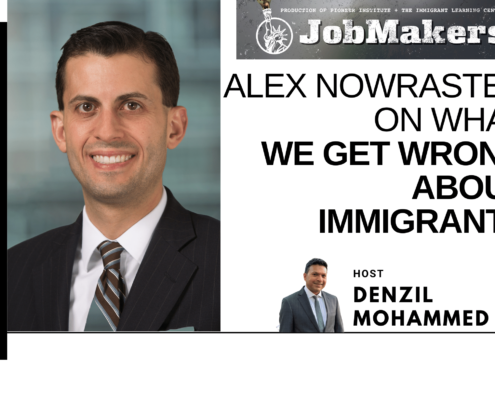
Alex Nowrasteh on What We Get Wrong About Immigrants
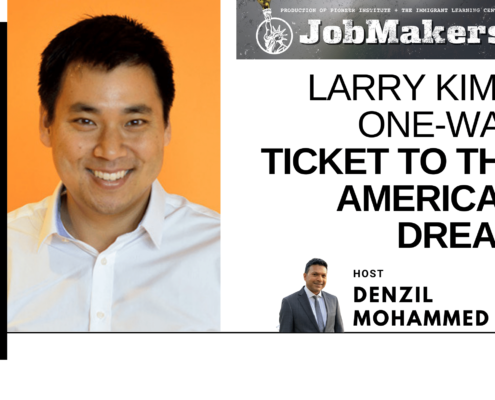
Larry Kim’s One-Way Ticket to the American Dream
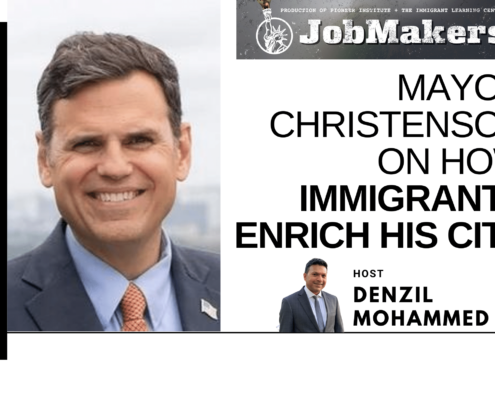
Mayor Christenson on How Immigrants Enrich His City
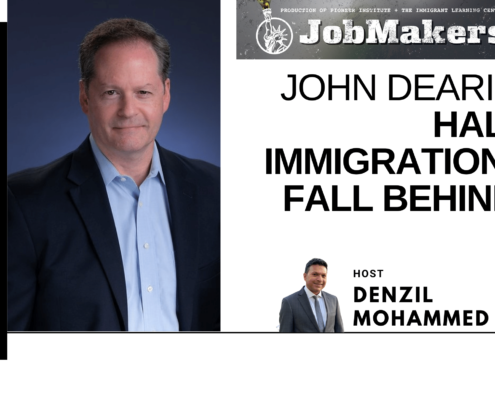
John Dearie: Halt Immigration? Fall Behind
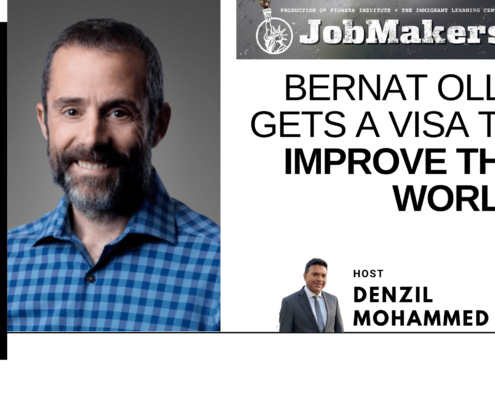
Bernat Olle Gets a Visa to Improve the World
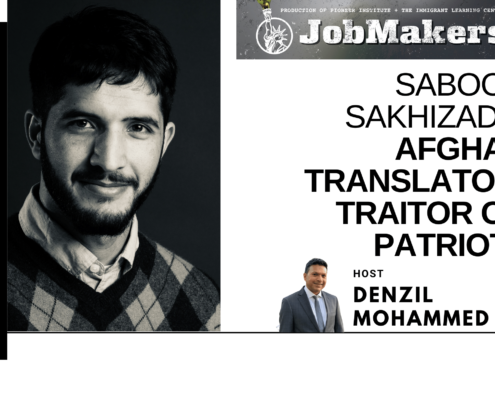
Saboor Sakhizada, Afghan Translator: Traitor or Patriot?
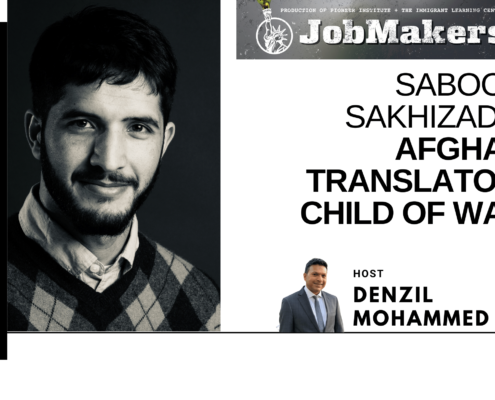
Saboor Sakhizada: Afghan Translator, Child of War
